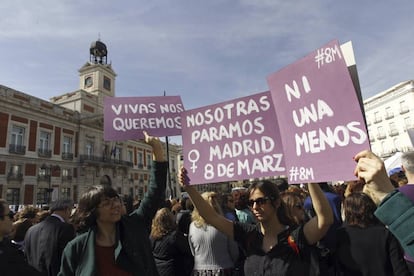Thousands of women march in Spain to demand equal rights
Events held in 49 cities against gender discrimination, domestic violence and pay inequality
Marches took place in 49 cities throughout Spain on Wednesday as part of events to mark International Women’s Day, just three months into a year that has already seen 16 women murdered by their partners, the highest number in that period over the last decade. In total, there have been 885 deaths in the last 15 years.

Combating gender-specific violence and addressing huge differences in salary and working conditions were the two main demands among protesters, many of whom pointed out that the World Economic Forum noted recently that at present rates of progress it will take another 169 years for this economic gap to close completely.
In Madrid, organizers said some 500,000 people took part in a march in the center of the capital carrying banners reading “United and strong, feminists always. International strike against the heteropatriarchy.” The local authorities put the number of people attending at 40,000.
María Gabián and her friends, all aged 18 or 19, said pressure needed to be kept up to bring about change, adding that they faced tougher challenges than previous generations of women. “There is more machismo on the television and in advertising. It is so deep-rooted it can’t be seen,” said one.
The Basque Country comes fifth in the European Union’s gender equality ranking
Standing in front of Madrid City Hall, 35-year-old Ángela Salso held aloft a placard reading “Let’s fight for women.”
“I have two young daughters and I am aware of what their future could be,” she said, referring to the salary gap between men and women, as well as gender violence.
“No to salary abuse,” “The murdered are missing,” “I don’t want compliments, I want your respect,” were among the other demands written on placards.
Eladio Martín, aged 76, said that she had been taking part in protests to demand equal rights since the 1970s. “Women make up more than half the planet and I want them free so that I can be free as well,” she said.
In Barcelona, hundreds of protesters accompanied by the all-women’s percussion group PercuDones, began their march at 7pm in the center of the city, and 90 minutes later arrived outside City Hall.
“Advertising is also violence,” “No to gender roles,” “Don’t congratulate me today, fight alongside me for 365 days of the year,” were written on placards. Local police said some 7,000 people took part in the march.
Sixteen women have been murdered in Spain so far this year
In Galicia, Iria Soutullo, a junior high school student from Pontevedra, addressed the parliament of the northwestern region, telling deputies on behalf of “the women of tomorrow,” that “inequality always begins in childhood,” and demanding the right for “girls to grow and develop in a world that guarantees their right to learn, lead, decide, and prosper.”
In the Basque Country, the regional parliament suspended activities for 10 minutes, during which time representatives of political parties called on the regional government to pass legislation to end violence against women. The text described gender violence as: “the most serious consequence of inequality,” adding that “all violence perpetrated against women should be combated in public and private life, including trafficking of women, sexual exploitation, violence in the domestic environment, and other acts against the human rights of women.”
The Basque regional government’s spokesman, Josu Erkoreka, noted in a press statement that the northeastern region was fifth country in the European Union’s gender equality ranking, after Sweden, Finland, Denmark, and the Low Countries.
The Basque Country’s business confederation, Confebask, noted that “much needs to be done” to improve equality in the business world, saying: “the presence of women is not representative in terms of their professional and personal capacity, and in terms of justice.”
With reporting from Sonia Vizoso, Mikel Ormazabal y Rebeca Carranco.
Tu suscripción se está usando en otro dispositivo
¿Quieres añadir otro usuario a tu suscripción?
Si continúas leyendo en este dispositivo, no se podrá leer en el otro.
FlechaTu suscripción se está usando en otro dispositivo y solo puedes acceder a EL PAÍS desde un dispositivo a la vez.
Si quieres compartir tu cuenta, cambia tu suscripción a la modalidad Premium, así podrás añadir otro usuario. Cada uno accederá con su propia cuenta de email, lo que os permitirá personalizar vuestra experiencia en EL PAÍS.
¿Tienes una suscripción de empresa? Accede aquí para contratar más cuentas.
En el caso de no saber quién está usando tu cuenta, te recomendamos cambiar tu contraseña aquí.
Si decides continuar compartiendo tu cuenta, este mensaje se mostrará en tu dispositivo y en el de la otra persona que está usando tu cuenta de forma indefinida, afectando a tu experiencia de lectura. Puedes consultar aquí los términos y condiciones de la suscripción digital.








































